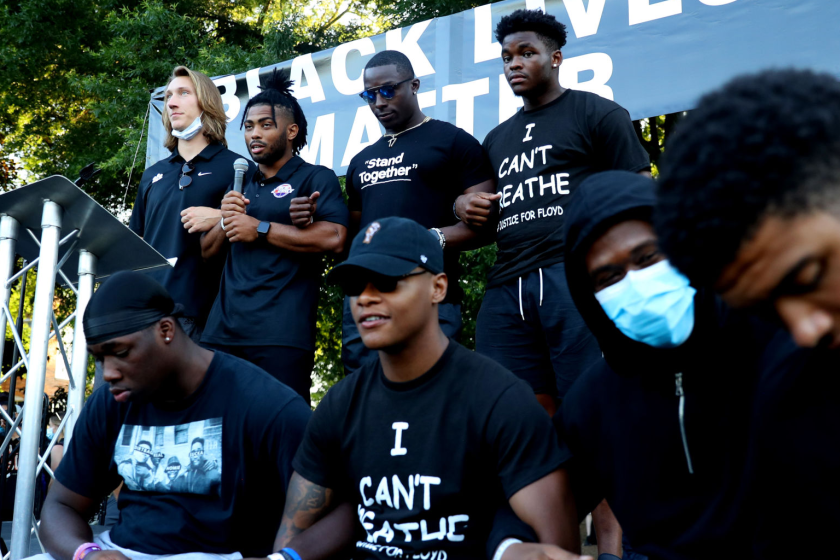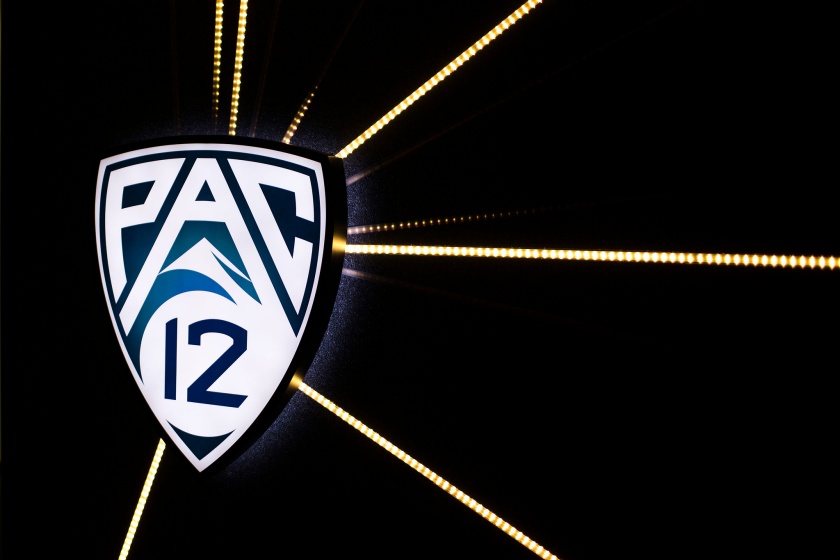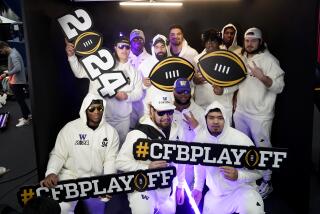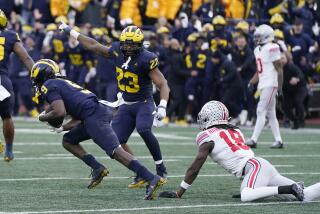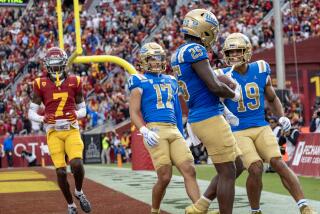Fate of college football in the air as athletes and coaches express desire to play
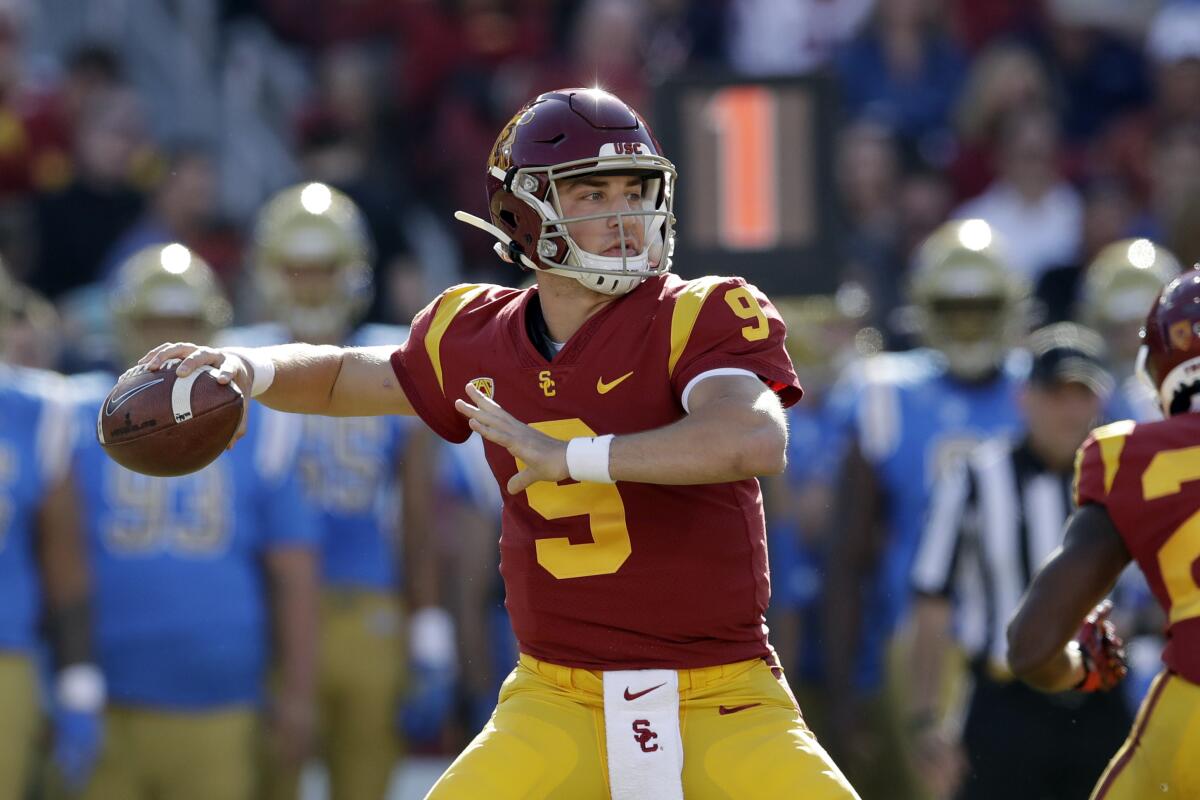
- Share via
The last stand to save the college football season was staked Monday as players and coaches made final pleas to play, politicians played up their performative outrage, and conference leaders engaged in a high-stakes game of chicken over a decision that could alter college athletics forever.
Tensions began mounting late Sunday night, when a collection of college football players, among them stars such as Clemson’s Trevor Lawrence and USC’s Kedon Slovis, pointedly declared their desires to play — and possibly even unionize — with a sweeping display of support on social media. Around the same time, commissioners of the Power Five and presidents and chancellors from the Big Ten were weighing the possibility of canceling the 2020 season.
The Big Ten appears to be on the verge of making that historic decision, less than a week after releasing a revised, conference-only schedule. That imminent announcement incited a firestorm among players and coaches on social media and upped the ante for officials from other top conferences, each of which must decide where to draw a line in the sand.
College football players have momentum to improve conditions during the pandemic. But not everyone is on board, as evidenced by what’s happening at Ohio State.
The Mountain West followed quickly, announcing that it would become the second Football Bowl Subdivision conference to cancel the 2020 season. But as tensions reach a fever pitch across college football, not every conference was ready to concede as of Monday night.
The Pac-12 remained mostly quiet amid the chaos, but is expected to make a decision on Tuesday. The Atlantic Coast Conference and American Athletic Conference are both reportedly moving forward with their seasons as planned.
In a statement on Twitter, Southeastern Conference commissioner Greg Sankey called for patience.
“This is all new & you’ll gain better information each day,” Sankey wrote. “@SEC has been deliberate at each step since March...slowed return to practice...delayed 1st game to respect start of fall semester.. ...Developed testing protocols...We know concerns remain. We have never had a FB season in a COVID-19 environment. Can we play? I don’t know. We haven’t stopped trying.”
A passionate uprising of players and coaches emboldened that effort Monday. How that fight to save the college football season might look by Tuesday night remains to be seen.
That fight showed no signs of slowing as of Monday afternoon.
Lawrence, who is widely projected to be the top pick in the upcoming NFL draft, positioned himself as a powerful voice at the center of the players’ #WeWantToPlay movement late Sunday night, having spent the weekend organizing players to save what’s sure to be his final collegiate season. He made the case over a series of tweets that players would be safer from COVID-19 in a controlled environment on campus.
“We are more likely to get the virus in everyday life than playing football,” Lawrence wrote on Twitter. “Having a season also incentivizes players being safe and taking all of the right precautions to try to avoid contracting covid because the season/ teammates safety is on the line. Without the season, as we’ve seen already, people will not social distance or wear masks and take the proper precautions.”
Slovis, the Pac-12 offensive freshman of the year last season, didn’t lend his voice to the #WeAreUnited movement among Pac-12 players, but chose to join Lawrence in speaking out Sunday night. Offensive tackle Jalen McKenzie, who was among the Trojans to offer support for the #WeAreUnited group, used social media to voice his desire to play.
UCLA cornerback Elisha Guidry, who was also involved in the organizing of the #WeAreUnited group, tweeted out a video depicting the two player movements as children hugging.
Not everyone viewed that unity through the same lens. As a wellspring of support grew among players late Sunday, USC running back Markese Stepp pointed to how quickly the players’ movement had changed directions.
“Y’all done switched up after the NCAA put they foot down,” Stepp wrote on Twitter. “Now everybody wanna play ball all of a sudden.”
By Monday afternoon, even the commander in chief had commandeered the cause. As rumors of cancellations swirled, President Trump joined the chorus of college football players and coaches by voicing his support to salvage the college football season.
“The student-athletes have been working too hard for their season to be cancelled. #WeWantToPlay,” the president wrote, while quote-tweeting a post from Lawrence.
A parade of like-minded politicians passionately took up the cause Monday. Rep. Jim Jordan (R-Ohio) tweeted that “America needs college football.”
Sen. Kelly Loeffler (R-Ga.), who recently disparaged WNBA players for speaking on social justice issues, called for pleas from college football players to be heard. Sen. Ben Sasse (R-Neb.) went as far as to write a letter urging Big Ten officials against cancellation.
“The structure and discipline of football programs is very likely safer than what the lived experience of 18-to-22-year-olds will be if there isn’t a season,” Sasse wrote.
The letter of demands, and threat of a boycott, sent by a group of Pac-12 football players last weekend called for payment of a debt long overdue, and it may change college football forever.
Across college football, coaches offered their impassioned pleas to play. Nick Saban declared that “players are a lot safer with us than they are running around at home.” Michigan coach Jim Harbaugh agreed, citing “facts” he learned over the past eight week. Penn State coach James Franklin said he was “willing to fight” for his players.
None appeared more passionate than Nebraska coach Scott Frost, who went as far as to threaten to play a season outside of the conference if the Big Ten opts to cancel.
“Our university is committed to playing no matter what,” Frost said. According to a report from the Detroit Free Press, Nebraska is one of two Big Ten schools, the other being Iowa, that were against cancellation in an initial vote of school presidents.
Frost warned of a grim future if cancellation went forward.
“People need to understand the carnage and aftermath of what college athletics looks like if we don’t play,” Frost said.
More to Read
Go beyond the scoreboard
Get the latest on L.A.'s teams in the daily Sports Report newsletter.
You may occasionally receive promotional content from the Los Angeles Times.

